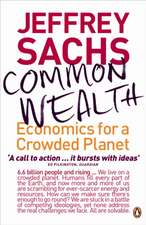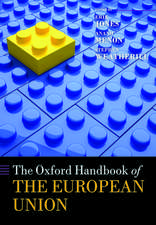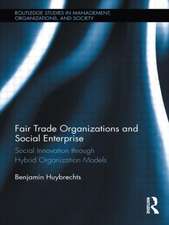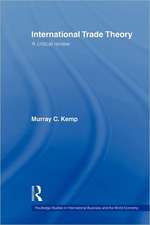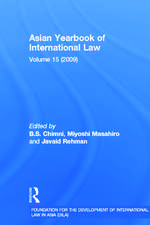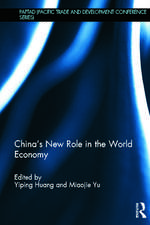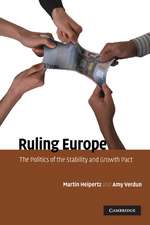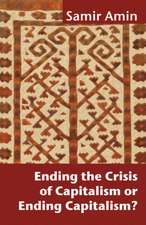The Political Economy of European Integration: Theory and Analysis
Autor Erik Jones, Amy Verdunen Limba Engleză Paperback – 4 noi 2004
The volume includes three types of chapters: broad literature reviews, narrower applications of existing arguments, and new syntheses of competing claims. The authors also present a critical appraisal of how scholars in the EU and US use theory to understand European integration, and examine issues such as citizens' attitudes, perceptions and preferences of actors, the role of non-state actors, principle-agent questions, and the role and the autonomy of European institutions.
This empirically informed and methodologically rigorous volume will be of great interest to students and researchers in the fields of comparative political economy, EU studies, international political economy and international organizations.
| Toate formatele și edițiile | Preț | Express |
|---|---|---|
| Paperback (1) | 414.32 lei 6-8 săpt. | |
| Taylor & Francis – 4 noi 2004 | 414.32 lei 6-8 săpt. | |
| Hardback (1) | 1274.11 lei 6-8 săpt. | |
| Taylor & Francis – 11 noi 2004 | 1274.11 lei 6-8 săpt. |
Preț: 414.32 lei
Nou
Puncte Express: 621
Preț estimativ în valută:
79.29€ • 86.10$ • 66.60£
79.29€ • 86.10$ • 66.60£
Carte tipărită la comandă
Livrare economică 22 aprilie-06 mai
Preluare comenzi: 021 569.72.76
Specificații
ISBN-13: 9780415340649
ISBN-10: 0415340640
Pagini: 236
Ilustrații: 5 tables and 4 line drawings
Dimensiuni: 152 x 229 x 13 mm
Greutate: 0.41 kg
Ediția:New.
Editura: Taylor & Francis
Colecția Routledge
Locul publicării:Oxford, United Kingdom
ISBN-10: 0415340640
Pagini: 236
Ilustrații: 5 tables and 4 line drawings
Dimensiuni: 152 x 229 x 13 mm
Greutate: 0.41 kg
Ediția:New.
Editura: Taylor & Francis
Colecția Routledge
Locul publicării:Oxford, United Kingdom
Public țintă
Postgraduate and UndergraduateCuprins
Introduction: Political Economy and European Integration Erik Jones and Amy Verdun 1. An American/European Divide in European Integration Studies: Bridging the gap with international political economy Amy Verdun 2. Non-State Actors and False Dichotomies: Reviewing IR/IPE approaches to European integration Maria Green Cowles 3. The Principal-Agent Approach and the study of the European Union: Promise unfulfilled? Hussein Kassim and Anand Menon 4. Idiosyncrasy and Integration: Suggestions from comparative political economy Erik Jones 5. The Role of Organized Interests in the European Political Economy Justin Greenwood 6. Imagined European Unions: Perceptions of the EU and support for EU enlargement Maurits van der Veen 7. European Monetary Integration and Class Strategies: The federation of German industry's position on monetary union from Bretton Woods to EMU Marcus Pistor 8. The EU and Inter-Regional Cooperation: Interests, preferences and structural power Mary Farrell 9. Understanding New Forms of European Integration: A study in competing political economy explanations Waltraud Schelkle 10. The Political Economy of European Integration in a Spatial Model Robert Pahre Conclusion: Convergence and divergence in the study of european political economy: Anatomy of a research agenda Erik Jones and Amy Verdun
Notă biografică
Erik Jones is the Resident Associate Professor of European Studies at Johns Hopkins Bologna Center, Italy. He is also a co-director of the European Union Political Economy interest section of the European Union Studies Association in the U.S. and is the European Editor of the Industrial Relations Journal.
Dr. Amy Verdun is an Associate Professor in the Department of Political Science, University of Victoria, Canada. She is also the Director of the European Studies Program. Dr. Verdun serves as the President of the International Political Science Association (IPSA) Research Committee 3 (RC-3) on European Unification.
European Responses to Globalization and Financial Market Integration. Perceptions of EMU in Britain, France and Germany, International Political Economy Series, Basingstoke: Macmillan/ New York: St. Martin's Press, 260 p. 2000 Paperback was published in July 2002. The Kosovo Crisis: Transatlantic National Perspectives and Implications for Future Defence Cooperation. Osvaldo Croci and Amy Verdun (eds), Manchester: Manchester University Press(forthcoming, 2005), Institutional Challenges to the European Union in the Wake of Eastern Enlargement, Amy Verdun and Osvaldo Croci (eds), Manchester: Manchester University Press (2005), The Euro: European Integration Theory and Economic and Monetary Union, edited by Amy Verdun, Boulder Colorado: Rowman and Littlefield (2002), Strange Power: Shaping the Parameters of International Relations and International Political Economy, edited by Thomas C. Lawton, James N. Rosenau and Amy C. Verdun, Aldershot/Burlington USA/Singapore/Sydney: Ashgate, 453 p. (2000).
Dr. Amy Verdun is an Associate Professor in the Department of Political Science, University of Victoria, Canada. She is also the Director of the European Studies Program. Dr. Verdun serves as the President of the International Political Science Association (IPSA) Research Committee 3 (RC-3) on European Unification.
European Responses to Globalization and Financial Market Integration. Perceptions of EMU in Britain, France and Germany, International Political Economy Series, Basingstoke: Macmillan/ New York: St. Martin's Press, 260 p. 2000 Paperback was published in July 2002. The Kosovo Crisis: Transatlantic National Perspectives and Implications for Future Defence Cooperation. Osvaldo Croci and Amy Verdun (eds), Manchester: Manchester University Press(forthcoming, 2005), Institutional Challenges to the European Union in the Wake of Eastern Enlargement, Amy Verdun and Osvaldo Croci (eds), Manchester: Manchester University Press (2005), The Euro: European Integration Theory and Economic and Monetary Union, edited by Amy Verdun, Boulder Colorado: Rowman and Littlefield (2002), Strange Power: Shaping the Parameters of International Relations and International Political Economy, edited by Thomas C. Lawton, James N. Rosenau and Amy C. Verdun, Aldershot/Burlington USA/Singapore/Sydney: Ashgate, 453 p. (2000).
Descriere
This book provides an accessible introduction to diverse political economy perspectives on different aspects of European integration. It presents a critical appraisal of how scholars in the EU and US use theory to understand European integration.

